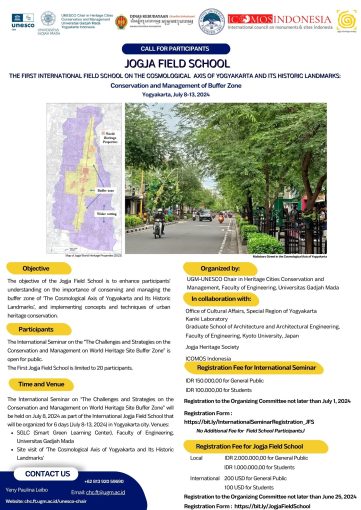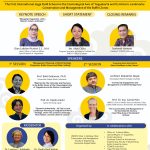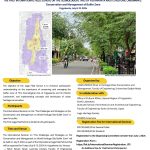
CALL FOR PARTICIPANTS
THE FIRST INTERNATIONAL FIELD SCHOOL ON
THE COSMOLOGICALAXIS OF YOGYAKARTA AND ITS HISTORIC LANDMARKS:
Conservation and Management of the Buffer Zone Yogyakarta Indonesia, July 8-13, 2024
Organized by:
UNESCO Chair in Heritage Cities Conservation and Management
Faculty of Engineering, Universitas Gadjah Mada, Yogyakarta, Indonesia
In collaboration with:
▪ Office of Cultural Affairs, Special Region of Yogyakarta
▪ Kanki Laboratory
Graduate School of Architecture and Architectural Engineering,
Faculty of Engineering, Kyoto University, Japan
▪ ICOMOS Indonesia
▪ Jogja Heritage Society
Yogyakarta, Indonesia
INTRODUCTION
Heritage saujana or cultural landscape heritage is the inextricable unity between a landscape and a community culture that includes cultural processes and products in the unity of space and time. The form of heritage saujana can tell the achievements of our ancestors in the past, and inform the tangible and intangible values that exist in the present and the future. A traditional city is an urban heritage saujana which has been shaped by its historical layers. Each layer has its saujana form composed by spatial patterns, architectural styles, infrastructure, public spaces, and various traditions and ways of life of the community. The urban vitality is rooted in the combined value expressions of place, people and traditions.
Yogyakarta, a traditional city in Java, is an urban saujana heritage that has existed since its establishment in 1775. The outstanding tangible and intangible heritage of Yogyakarta has brought the city to a World Heritage Site, a prestigious designation from UNESCO for the city. The philosophical axis that runs longitudinally from north to south of the city has been inscribed by UNESCO in September 2023 as the World Heritage Site with the official name ‘The Cosmological Axis of Yogyakarta and Its Historic Landmarks’.
There are 10 groups of buildings and structure along the philosophical axis that become the attributes of the property, surrounded by a buffer zone which is a residential area around the attributes. Therefore, the role of the buffer zone is very important in providing support for the sustainability of the World Heritage Site, because the philosophical axis is in a dynamic living area, constantly moving and changing.
Along with the management of ‘The Cosmological Axis of Yogyakarta and Its Historic Landmarks’ which continues to be carried out and planned, attention and management of the buffer zone must also be carried out in a balanced manner. As the urban heritage, the buffer zone which is urban residential areas expresses both tangible and intangible values. The buffer zone is rich in traditional and contemporary values that can be observed from its various architecture forms, spatial patterns, people’s way of life, traditional arts and crafts, and also the atmosphere of Yogyakarta’s traditional urban settlements. The tangible expressions of place and people and the intangible values residing in those places should be understood, conserved and managed as the unique spirit of the buffer zone. However, since Yogyakarta urban saujana heritage is in a dynamic environment that always changes over time, the buffer zone heritage in it has undergone many changes, both in its landscape and culture. On the other hand, management and conservation efforts are still focused on the World Heritage property, and the buffer zone has not been fully the focus of attention.
In order to response the comprehensive needs, in scientific as well as practical on the management and conservation of the buffer zone of ‘The Cosmological Axis of Yogyakarta and Its Historic Landmarks’, the Jogja Field School (JFS) program will be conducted, organized by UNESCO Chair in Heritage Cities Conservation and Management, Faculty of Engineering, Universitas Gadjah Mada in collaboration with Kanki Laboratory, Graduate School of Architecture and Architectural Engineering, Faculty of Engineering Kyoto University, Office of Cultural Affairs, Special Region of Yogyakarta, ICOMOS Indonesia and Jogja Heritage Society (JHS). The JFS program will focus on learning together to find the unique values and heritage strengths of the dynamic urban heritage of the buffer zone, and apply the concepts of conservation and management comprehensively.
THE OBJECTIVES
The objective of the Jogja Field School is to enhance participants’ understanding on the importance of conserving and managing the buffer zone of ‘The Cosmological Axis of Yogyakarta and Its Historic Landmarks’, and implementing concepts and techniques of urban heritage conservation. In detail, the objectives of the Jogja Field School program are:
- To give participants understanding on the potential and unique values of the buffer zone, including the setting and culture systems, living culture, heritage buildings, traditional building architecture, and other urban environmental components.
- To give participants a comprehension on conservation and management of the buffer zone as the supporting area of ‘The Cosmological Axis of Yogyakarta and Its Historic Landmarks’.
- To enhance participant skills in implementing concepts, methods, conservation and management processes in the actual cases.
- To give participants experience in doing a research on urban conservation, focusing on heritage areas where the cosmological axis landmarks are located.
TIME AND VENUE
The International Seminar on “The Challenges and Strategies on the Conservation and Management on World Heritage Site Buffer Zone” will be held on July 8, 2024
as part of the International Jogja Field School that will be organized for 6 days (July 8-13, 2024) in Yogyakarta city. Venues:
▪ SGLC (Smart Green Learning Center), Faculty of Engineering, Gadjah Mada University
▪ Site visit of ‘The Cosmological Axis of Yogyakarta and Its Historic Landmarks’.
INTERNATIONAL SEMINAR SPEAKERS
▪ Ms. Moe Chiba, Chief of Culture Unit, UNESCO Office in Jakarta (Short statement)
▪ Prof. Ir. Bakti Setiawan, M.A., Ph.D. Professor, Department of Architecture and Planning, Universitas Gadjah Mada, Yogyakarta, Indonesia
▪ Prof. DR. Kiyoko Kanki, Kanki Laboratory, Architecture and Human Environmental Planning, Graduate School of Urban, Environmental Engineering, Kyoto University, Japan
▪ Prof. dr.ing. Carola Hein, UNESCO Chair in Water, Ports and Historic Cities, Leiden-Delft Erasmus Universities, the Netherlands (online)
▪ Architect Debashish Nayak, Ahmedabad World Heritage City, India
FIELD SCHOOL FACILITATORS
▪ Prof. DR. Kiyoko Kanki, Kanki Laboratory, Architecture and Human Environmental Planning, Graduate School of Urban, Environmental Engineering, Kyoto University, Japan
▪ Mr. Donovan Rypkema, Principle, Heritage Strategies International, Washington DC, USA (online)
▪ Architect Debashish Nayak, Ahmedabad World Heritage City, India
▪ Prof. Ir. Bakti Setiawan, M.A., Ph.D. Professor, Department of Architecture and Planning, Universitas Gadjah Mada, Yogyakarta, Indonesia
▪ DR. Wouter van Gent, University of Amsterdam, the Netherlands
▪ DR. Ir. Laretna T. Adishakti, M.Arch, UGM-UNESCO Chair in Heritage Cities Conservation and Management, Yogyakarta, Indonesia
▪ DR. Ir. Dwita Hadi Rahmi, M.A, UGM-UNESCO Chair in Heritage Cities Conservation and Management, Yogyakarta, Indonesia
▪ Ir. Titi Handayani, M.Arch, Jogja Heritage Society, Yogyakarta, Indonesia
PARTICIPANTS
The International Seminar on the “The Challenges and Strategies on the Conservation and Management on World Heritage Site Buffer Zone” is open for public.
The First Jogja Field School is limited to 20 participants, they are:
1. Students from Indonesian or overseas universities who have concerns on urban cultural landscape heritage conservation.
2. Lecturers, researchers from Indonesia or overseas universities with interdisciplinary sciences related to the program topic
3. Parties and professionals who have concerns on urban cultural landscape heritage conservation (individuals, government, cultural and heritage associations, arts associations, environmental associations, tourism experts, etc).
ACTIVITY PROGRAM
In Jogja Field School program, participants will experience fun learning activities, as follow:
| Time | Morning | Afternoon | Evening |
| July 7 | Arrival of participants in Yogyakarta | ||
| July 8 | Opening Int. Jogja Field School & Seminar International Seminar at SGLC UGM (open for public as well) |
International Seminar at SGLC UGM (open for public as well) |
Welcome reception (Speakers, Facilitators & Field School Participants only) |
| July 9 | Masterclasses at SGLC UGM | Masterclasses at SGLC UGM | |
| July 10 | Guided field visit | Guided field visit | Optional visit ArtJog |
| July 11 | Masterclasses & field visit
discussion at SGLC UGM |
Group field visit | |
| July 12 | Working group at SGLC UGM | Working group at SGLC UGM | |
| July 13 | Presentation & closing ceremony
at SGLC UGM |
Optional tours
Departure of the participants |
|
| July 14 | Optional tours/ Departure of the participants | ||
FACILITIES FOR FIELD SCHOOL PROGRAM
- Program Materials
- Transportation to the field visit
- Meals within the program
- Certificate
FACILITES NOT INCLUDED:
- Transportation of participants to Yogyakarta
- Passport and visa arrangements,
- Health insurance
- Accommodation
- Additional field trip/heritage trail (post summer school) in Yogyakarta,
- Personal expenses and equipment during the program.
OPTIONAL PROGRAM
The organizer may organize additional heritage tours in July 14, 2024 upon requested (fee is not included in Jogja Field School registration fee), such as Borobudur & Prambanan World Heritage Temples, Kotagede Heritage Trail, Imogiri & Batik Heritage Trail.
REGISTRATION AND FEE
Participants of the International Jogja Field School may register to: UNESCO Chair in Heritage Cities Conservation and Management Faculty of Engineering, Universitas Gadjah Mada
Prof. Herman Johannes – Engineering Research and Innovation Center/ERIC Building,
Jl. Grafika 2, Campus UGM, Yogyakarta 55281, Indonesia. Phone: +62 813-9205-9690.,
Website: chc.ft.ugm.ac.id/unesco-chair
Confirmation of participation by Registration Form: https://bit.ly/JogjaFieldSchool
Contact Person: Yeny Paulina Leibo, Email: chc.ft@ugm.ac.id, Phone: +62 813 920 59690
Registration Fee
- Domestic IDR 2.000.000,00 for General Public
IDR 1.000.000,00 for Students - International 200 USD for General Public
100 USD for Students
Registration fee should be transferred to Bank Account:
Yeny Paulina Leibo
Bank Negara Indonesia (BNI) 0477281523
Registration to the Organizing Committee not later than June 25, 2024
Note: the registration will be closed once the maximum number of participants is reached
Call for Participants INTERNATIONAL JOGJA FIELD SCHOOL – SEMINAR 2024 as of 24 June 2024



